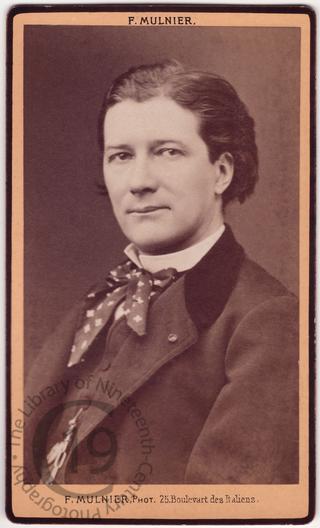
Victorien Sardou
A carte-de-visite portrait of the French dramatist Victorien Sardou (1831-1908).
One of the most successful dramatists of the Second Empire and the Belle Epoque, Sardou wrote copiously on many subjects in many styles, with expert craftsmanship and superficial brilliance. Like much popular, but secondary, nineteenth century drama, his writing depending on the exploitation of a successful formula.
His first outstanding success was a comedy Les pattes de mouche (1860), seen in London in 1861 as A Scrap of Paper. Of his historical plays, the best known is Madame Sans-Gêne (1893). The part of a Duchess of Dantzig, a washerwoman whose husband becomes one of Napoleon’s marshals, was created by Réjane, and played in an English adaptation by Ellen Terry in 1897. The best of the romantic melodramas were Fédora (1882) and La Tosca (1887), the latter providing the libretto for Puccini’s opera Tosca (1900). Both plays were written for Sarah Bernhardt, who revived them many times, and appeared also in a number of Sardou’s other plays.
Two social dramas which are typical of their type are Dora (1877) and Divorçons (1880). The former, in a translation by Clement Scott as Diplomacy, had a great success in London in 1878. The latter, under its original title, was seen at the Duke of York’s Theatre in 1907. The hollowness of the psychology of his more serious works is only too evident, illustrating how much more at home he was in historical comedy.
Sardou, who was already to exploit whatever dramatic form seemed assured of popular success, was a favourite target of contemporary critics, and George Bernhard Shaw, who disliked everything he stood for, coined the word ‘Sardoodledom’ describe his plays.
Photographed by Ferdinand Mulnier of Paris.
Code: 124331




